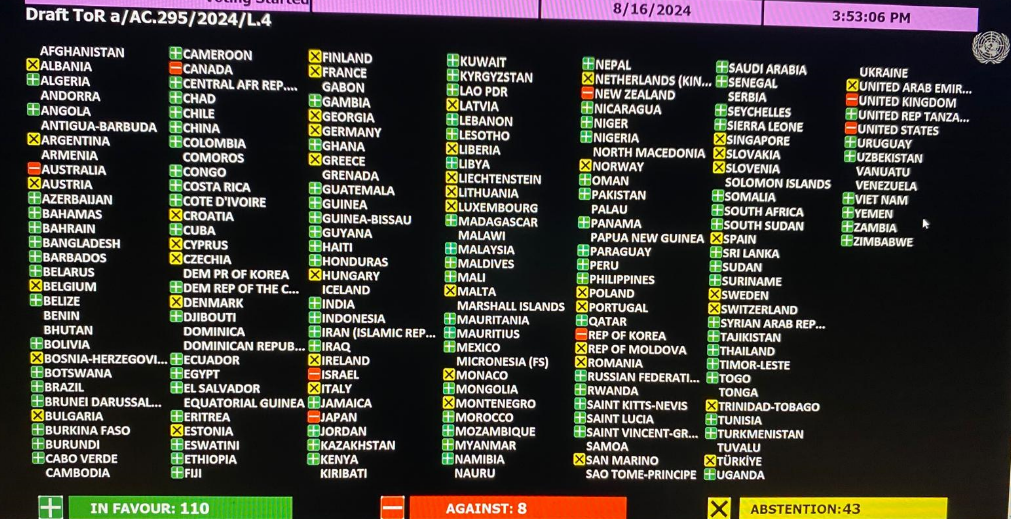
Image of the final vote results on the TOR for the UN Tax Convention
Gaining UN approval for negotiating a legally binding agreement is usually a journey, and often quite a tricky and tiresome one. On 16th August, one such expedition reached a momentous destination however as, in a historic win for tax justice, UN States, including all those engaged in the Fair Tax Monitor’s work, overwhelmingly voted in favour of the terms of reference (TOR) for the UN Tax Convention.
The adoption of the TOR is the product of a decades-long struggle for tax justice from national governments and civil society organizations and sets the stage for the creation of new global tax rules that are progressive, fair and provide the financing needed for development, public services, and climate action.
Current global tax rules are unjust. As a result of ineffective international tax cooperation, millions upon millions in revenues are lost every day to tax abuse by multinational corporations and the rich. The TOR for the UN Tax Convention lays the groundwork to put an end to tax abuse and to finally deliver on the sustainable financing that is so urgently needed.
With significant leadership from the African Group and G77 countries the TOR were adopted by 110 votes to 8, with 43 abstentions. In a notable shift, EU countries, which last year voted against the original resolution calling for a framework convention on international tax cooperation, this time abstained. This signifies positive progress on the issue among those countries. After all, a fair and effective global tax system that tackles tax havens and promotes development and environmental protection is in the interest of all countries.
Thanks to the partnership between Tax Justice Network Africa (TJNA), Oxfam and numerous national and local CSOs, FTM has empowered civil society organizations and policymakers in various countries to advocate for more equitable tax policies. The comprehensive data and insights we have generated have been instrumental in shaping the discourse around global tax justice, providing a strong foundation for the arguments presented by the African Group and G77 countries during the UN negotiations.
Moreover, the FTM’s country-specific reports have contributed to mobilizing support at the national level, ensuring that the voices of the most affected countries were heard in the global arena. By shedding light on the detrimental impacts of tax abuse and the need for robust international cooperation, FTM has contributed to the growing consensus that the current global tax system is inadequate and in dire need of reform.
As we celebrate this milestone, we recognize that the journey is far from over. The FTM remains committed to monitoring the progress of the UN Tax Convention negotiations and continuing to provide the necessary research and advocacy to ensure that the final outcomes are truly transformative. We believe that our ongoing efforts will be crucial in securing a tax system that is just, sustainable, and beneficial for all, particularly for the countries that have been most disadvantaged by the existing global tax framework.
The final, adopted text and the mandate for the upcoming 3 years of UN Tax negotiations can be found here.
